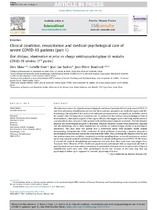Clinical condition, resuscitation and medical-psychological care of severe COVID-19 patients(part 1)
Date
2021Author
Maoz, Zeev
Huet, Isabelle
Sudres, Jean-Luc
Bouchard, Jean-Pierre
Metadata
Show full item recordAbstract
This interview covers the clinical and psychological condition of patients afflicted with severe COVID-19
and their pulmonary rehabilitation process. For these patients, symptoms are medically urgent and lifethreatening. The sequelae of this viral attack and immune response to it are significant, and often persist
for months after discharge from intensive care. To understand the medical and psychological state of
these patients, a description is given of the organs affected, the oxygen cycle in the body and the medical
care procedures that are used to help patients with dysfunctional respiratory systems. The link between
physical and psychological progress is described. Physical weakness results from pulmonary sequelae
and deconditioning, and is often experienced by patients as mental fatigue similar to psychological
depression. This may draw the patient into a downward spiral, with multiple health aspects
deteriorating, independently of the resolution of initial problems. Conversely, a positive physical or
psychological evolution may lead to the evolution of the other. Thus, reversing the negative trend for just
one system component can delay, completely arrest the spiralling down, or transform it into an upward
spiral, improving the patient’s condition. In addition, for people undergoing severe COVID-19, the return
to normal life could be destabilizing and memories that arise from their crisis state may trigger PostTraumatic Stress Disorder (PTSD). Health and psychosocial professionals hold an important role both in
post-hospital care and in secondary prevention, i.e. prevention of relapse and re-hospitalization. Physical
rehabilitation work must take these psychological factors into account, in the same way that any
psychological follow-up is supposed to consider physiological factors.

